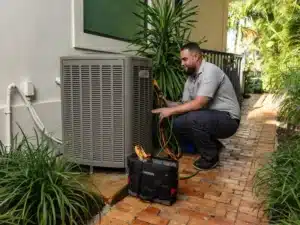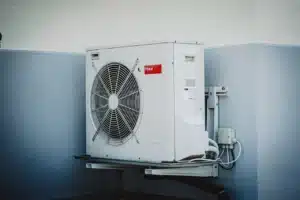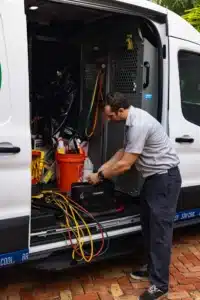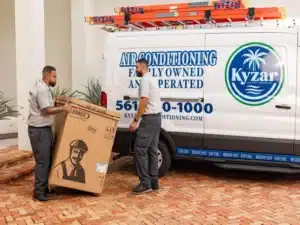The Benefits of Installing a Whole-Home Humidifier
Maintaining the right level of humidity in your home can...
Central air conditioning systems play a crucial role in keeping homes cool and comfortable, especially in a warm and humid climate like West Palm Beach, Florida. In this blog post, we’ll dive into the nuts and bolts of how central air conditioning units work, providing a factual and straightforward explanation of the process.
A central air conditioning system consists of two main components: the indoor unit, known as the evaporator coil, and the outdoor unit, housing the condenser coil. Connected by refrigerant lines, these components work together to cool and circulate air throughout your home.
Central air conditioners operate on the principles of the refrigeration cycle. The process begins with the evaporator coil inside your home. Warm indoor air is drawn over the coil, and the refrigerant inside absorbs the heat from the air, transforming it from a liquid into a low-pressure gas.
The refrigerant, now in a gaseous state, is pumped to the outdoor unit, where the compressor pressurizes it. As the gas is compressed, its temperature rises. This hot, pressurized gas then flows through the condenser coil, located in the outdoor unit. Here, the heat from the gas is released into the outside air, causing the refrigerant to return to a liquid state.
The liquid refrigerant is then sent back to the indoor unit, and the expansion valve allows it to rapidly expand. This expansion results in a drop in pressure, causing the refrigerant to evaporate and absorb heat from the surrounding indoor air. The now-cooled air is then blown into your home’s ductwork, effectively lowering the indoor temperature.
The cooled air is distributed through the ductwork and into the various rooms of your home by a blower fan. Meanwhile, the warm air from inside is drawn back to the evaporator coil, and the cycle repeats until the desired indoor temperature is reached.
The central air conditioning system is controlled by a thermostat, which allows you to set and regulate the desired temperature. Once the set temperature is achieved, the system cycles off until the thermostat detects the need for additional cooling.
Understanding the mechanics of central air conditioning provides insight into how these systems effectively combat the West Palm Beach heat. The refrigeration cycle, compression, heat release, expansion, and cooling processes work in harmony to maintain a comfortable indoor environment. If you have any questions or need professional assistance with your central air conditioning unit, contact a professional HVAC company in West Palm Beach.

Maintaining the right level of humidity in your home can...

Air conditioning is essential in Florida’s hot and humid climate,...

Air conditioning is critical in Florida’s hot and humid climate....

For most Florida homeowners, air conditioning isn’t a luxury—it’s a...

Indoor air quality is a growing concern for many Florida...

Many homeowners in Florida focus on keeping their homes cool...